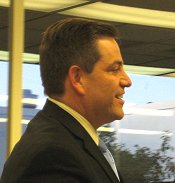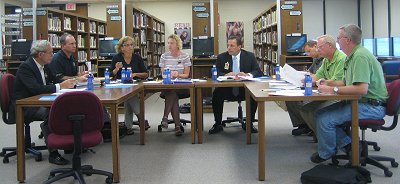- By Dan Veaner
- News
 Print
Print 
David Angelo
"If you don't make your savings Johnson Controls writes you a check," Johnson Control's David Angelo said. "It all fits within the parameters of when you get your first check from the state and when your first payment is due. And most importantly when your first state aid check is due so there will be no outflow of cash from the district before all of this kicks in."
Together with $410,000 of New York State Education Department EXCEL (Expanding our Children's Education and Learning) aid district officials hope to address at least some of the serious building deterioration issues that were not addressed when a $20 million capital project was voted down in 2007. "The idea is that we put together the energy performance contract with the EXCEL project," says Superintendent Stephen Grimm. "We have to vote on the use of the EXCEL money. We'll do that in the same vote. Together we get a little over $5 million of capital improvements for little to no cost to the taxpayer."
The idea of an energy savings performance contract first came up in 2005 when Angelo first discussed it with then Interim Business Administrator Gary Alger. It was kicked around as a possible element of the capital project, and has lingered as an idea for three years. When Grimm started working in the district in January his first appointment was with Angelo, who still wanted to pursue the project. Realizing that many of the improvements could be made at virtually no cost to the district, he pursued the idea along with a facilities committee and with the help and advice of Buildings & Grounds Supervisor Glenn Fenner, who suggested improvements to the original plan.

Stephen Grimm
Lansing failed an inspection last year with six of the seven district buildings receiving an unsatisfactory rating from the State. While school board members see another capital project in the future that must minimally address the issues uncovered looming, many of the problems identified in that inspection are addressed in this project. That could mean a less expensive capital project when the time comes.
Grimm says that the $410,000 of EXCEL money can generate $1.1 million of capital improvements. While the money has been allocated to Lansing by Albany, district voter approval is needed in order to spend it. Voter approval is not required when entering into an energy savings performance contract, but Grimm says that the district can actually get more money for the project if the voters do approve it. "We do not need voter approval to enter into an energy performance contract," he says. "But we are going to seek voter approval because we can obtain a higher level of State aid when we actually pay for it."
With the capital project failing and four superintendents and a half dozen business administrators over the past three years, the project has been chronically on hold. But officials say the delay in getting the project off the ground actually benefited the district. "The program frankly got better as we went along, because Steve, (Business Administrator) Mary June (King), and Glenn and his staff really stepped up," Angelo said. "The program is substantially better today because of the facilities committee. Even though it took additional time I think these school is really going to benefit."
 Lansing Board of Education (Left to right) Richard Thaler, Glenn Swanson, Sandy Dhimitri, Anne Drake, Superintendent Stephen Grimm, Glenn Cobb, David Dittman, Michael Cheatham |
The contract signed by School Board President Anne Drake details the upgrades and improvements Johnson Controls will implement, as well as the projected annual savings they will accrue. Window film will help keep classrooms from overheating. Inefficient motors will be replaced. New vestibule doors will be installed to keep outside air from heating or cooling the buildings. A heavy duty condensing boiler will be installed. A geothermal well field will be drilled next summer to use the ground to provide heat and cooling.
Lighting systems changes will create NYSERTA rebates and energy savings. Those savings will be used to upgrade the high school pool lighting. Angelo said that the current lighting is 11 foot candles, but should be at 50. Everywhere else in the schools the lights are brighter than they should be and that will also be adjusted.
Computer network controls will save energy by turning off computers at night when they are not in use. A temperature control overlay system will allow district officials to control temperatures on campus from any location, even off campus by accessing it over the Internet.
The project also includes a plan to dehumidify the pool and reduce the chloride small in the high school. Pool doors will be replaced, and stronger structural material will be used along the outside wall. Window space will be reduced there as well.
The vote to approve the EXCEL expenditure and the energy contract is planned for December 8th.
----
v4i34



